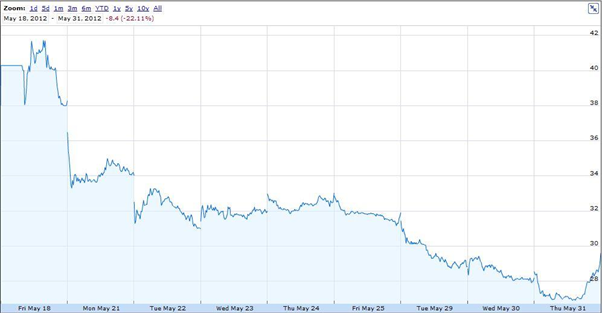
Facebook floatation: what went wrong?

When Facebook announced it was going to float on the stock exchange it created a media frenzy unlike anything ever seen before in IPOs.
TV interviews, newspaper articles, blogs, podcasts...you name it, we're all talking about how Facebook shares were going to climb and the company would be worth hundreds of billions of dollars. There was also an unhealthy interest in how much money the chairman and CEO, Mark Zuckerberg, would make from the IPO.
The press and media, in general, portrayed Facebook as a win-win, no-fail dream stock that would go on to provide investors with amazing returns on investment. Indeed, there were sceptics, but to shout above the ruckus proved challenging to say the least.
Would it be a fair statement to say that investors’ judgment was clouded due to the overwhelming positive coverage of the Facebook IPO? Perhaps it was. However, if you are going to invest your money into stock markets, it is essential to make an objective decision based on solid analysis, not just media hype.
 The obvious conclusion is in fact a simple question. Is it wise to invest in Facebook? Sadly, there is no yes or no answer to this and as a London ppc agency perhaps MintTwist isn't best placed to answer the question. However, there are very few businesses with 900 million customers!
The obvious conclusion is in fact a simple question. Is it wise to invest in Facebook? Sadly, there is no yes or no answer to this and as a London ppc agency perhaps MintTwist isn't best placed to answer the question. However, there are very few businesses with 900 million customers!
“It is unclear how inclined and able the company is going to be in terms of monetising its substantial user base and related data and information.” SCOTT KESSLERThe first question that people need to ask is 'how does Facebook make its money?' After all, a company valued at close to USD100 billion must be making a lot of cash and be profitable. So let’s look at some numbers:
- For 2012, Facebook should reach USD5.78 billion in advertising revenue globally, up from the earlier estimate of USD5.74 billion and more than double the USD2 billion made in 2010
- Facebook will get USD3.8 billion from advertising this year, up 104 percent from USD1.86 billion in 2010
- The company should make USD470 million from Facebook Credits—a virtual-currency programme that lets users buy items in games—more than triple the USD140 million it made last year.
The smart phone factor
We also know that advertising on smart phones is the one area from which Facebook has struggled to generate revenue. Because smart phones are smaller and therefore space is at a premium, advertising is much harder to effectively integrate without shunning users. Nine days prior to the Facebook flotation, Facebook even warned that “future revenue would be hurt by a dearth of advertising on handheld devices, which its users were increasingly using to access the site.” Furthermore, Scott Kessler, an internet equity analyst at S&P Capital IQ stated that "It is unclear how inclined and able the company is going to be in terms of monetising its substantial user base and related data and information...They're going to have growth, but people wonder about the sustainability of the growth, the quality of the growth and ultimately the profitability of the growth over a longer period of time." Citing mobile as a concern, Kessler lowered his earnings estimates for 2012 to 39 cents (USD) a share from 40 cents. For 2014, he reduced his projection to 83 cents from 92 cents, according to the report. Looking at how the Facebook share price has performed since floating on the stock market says it all. The obvious conclusion is in fact a simple question. Is it wise to invest in Facebook? Sadly, there is no yes or no answer to this and as a London ppc agency perhaps MintTwist isn't best placed to answer the question. However, there are very few businesses with 900 million customers!
The obvious conclusion is in fact a simple question. Is it wise to invest in Facebook? Sadly, there is no yes or no answer to this and as a London ppc agency perhaps MintTwist isn't best placed to answer the question. However, there are very few businesses with 900 million customers!